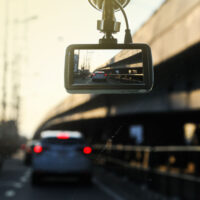How Dashcam Evidence Helps Car Accident Claims

Assuming you are a safe driver, there may be a low-cost technology that assures another driver won’t blame you for causing an accident when behind the wheel.
A dash camera is an onboard recorder, also known as a dash cam, event data recorder (EDR), or digital video recorder (DVR). You can mount the camera on your dashboard or the rearview mirror to record the road in front of you. It records audio and video using Wi-Fi, Bluetooth, and 4G connectivity.
Be careful, though. Suppose you are the reckless party speeding, tailing the car in front of you, not paying attention, or arguing with someone in the vehicle. In that case, the camera will also record your behavior and could help the other side who accuses you of causing an auto accident.
Some models also have a cabin camera that records everyone inside the vehicle. Since Alabama is a one-party state, the law states that just one person has to be aware that a recording is taking place, so the subject you are recording does not have to be made aware that they are being recorded as long as you are taking part in the conversation.
For the consumer, a dashcam can be your best friend if there are any questions about the cause of an accident. Even if your car is parked, the camera can be set to reveal who is approaching the vehicle and trying to break in.
Dashcam Evidence
In 2021, the Alabama Supreme Court ruled dashcam and police bodycam videos are considered investigative materials, similar to police notes, and cannot be hidden from the public. They are an essential part of your case. Police departments routinely use dashcams during a routine traffic stop.
You’ve seen their usefulness in holding law enforcement accountable for poor police procedures. We’ve also seen instances where the subject of a stop acted irresponsibly to their detriment. Instead of relying on an eyewitness to an accident, the dash cam is reliable. The evidence is irrefutable.
Suppose we see the at-fault driver weaving through traffic, cutting off cars, speeding, making sudden turns, tailgating, exhibiting signs of road rage, stopping suddenly, running a light or stop sign, and generally driving recklessly, which leads to an auto accident. In that case, there is nothing left to say at the scene.
If the at-fault driver has a dashcam, be sure to tell the police at the scene so they can download the data from his camera. Evidence in a case has a way of suddenly disappearing in some instances, as the at-fault driver can be aware enough to hide the camera.
As for your part, if the interior cabin camera is on, you do not want to get caught saying, “I need to slow down,” or something that could lead to the police concluding that you contributed to the accident.
Under Alabama’s contributory negligence rules, anyone who contributes to an accident loses the ability to be compensated by the other side’s insurance provider, even if he was 99% guilty of causing the auto accident.
Your Alabama Car Accident Attorney
So, for an investment as little as $50, a dashcam is a reliable way to ensure you are not falsely charged with causing an accident.
Attorney Chip Nix, your experienced Alabama car accident attorney, will present the dashcam footage, the evidence from the scene, the police report, and eyewitness reports to the insurance company for the at-fault driver. Mr. Nix has decades of experience in how the negotiating process works. Armed with evidence, the insurance company will be encouraged to offer a fair settlement to help make you whole.
If you or a loved one have sustained an injury in a car accident, and you have mounting medical bills and lost wages, Attorney Chip Nix has experience helping many others in your spot. He has used dashcam footage in court to prompt settlement negotiations to his client’s advantage. Without the dashcam evidence, it is one person’s version of events against another’s. This is not a time to try and negotiate on your own. The insurance companies rarely have your interest at heart.
Call the Montgomery law office of Attorney Chip Nix at (334) 203-6669 to arrange a complimentary consultation before evidence disappears and while memories of the accident are fresh.
Sources:
Alabama Recording Laws
https://recordinglaw.com/united-states-recording-laws/one-party-consent-states/alabama-recording-laws-2/#:~:text=As%20Alabama%20is%20a%20one,are%20personally%20taking%20part%20in.





